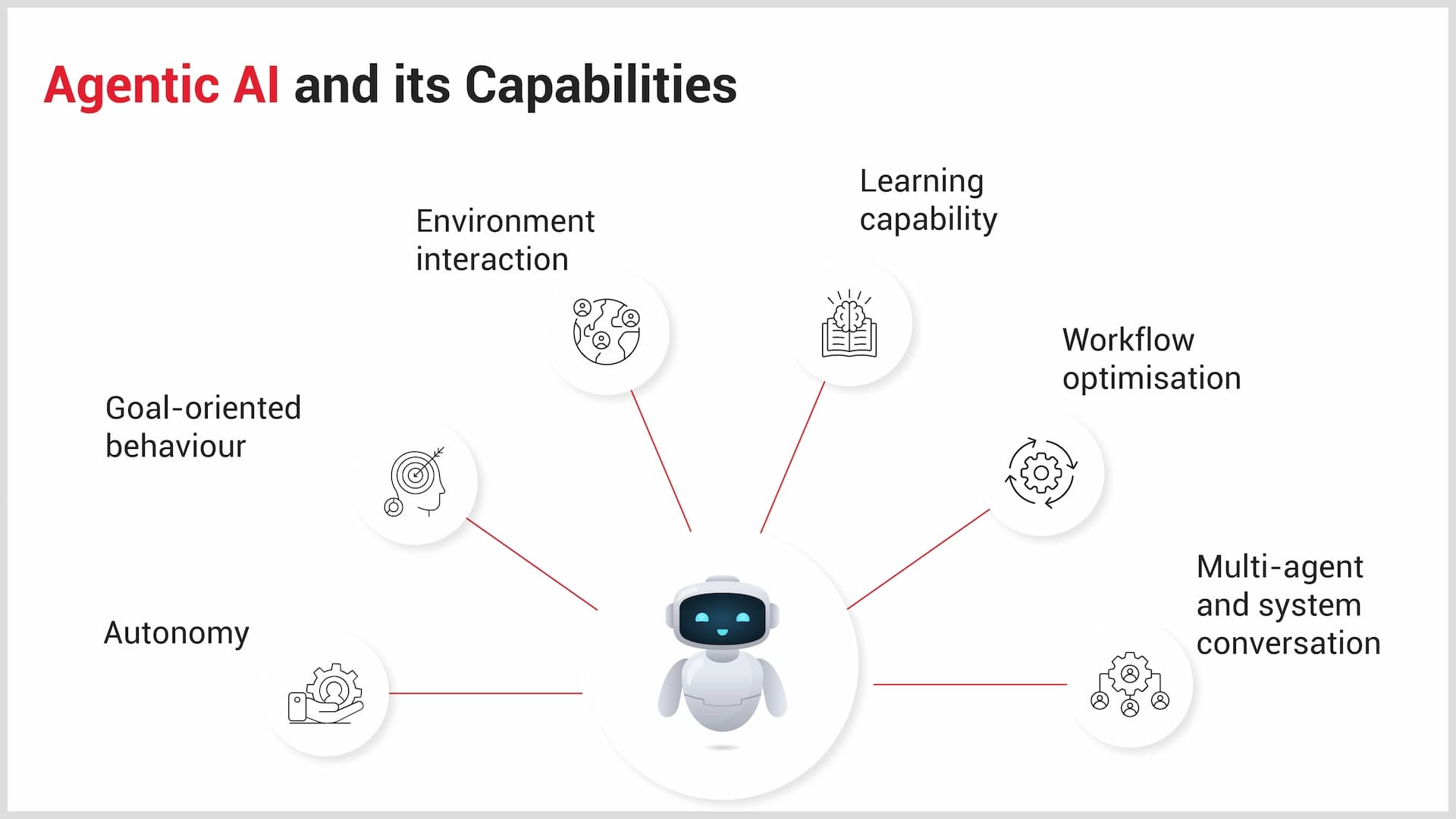Rendered at (server): 2026-02-22T01:13:49.513Z
Agentic AI: Shaping Smarter Workforces Through Co-Creation
16 December, 2024
Harnessing Agentic AI is about unlocking unparalleled potential for enterprises and SMEs. In a world where speed, innovation, and efficiency dictate success, businesses must leverage every advantage. Agentic AI goes beyond traditional augmentation by enabling co-creation and shared intelligence, fostering dynamic collaboration between humans and AI to solve complex challenges.
With global AI contributions to GDP projected to reach $2.6–$4.4 trillion annually by 2030, industries like energy are leading the charge, with investments in generative AI set to triple—from $40 billion in 2023 to over $140 billion by the end of the decade (PwC).
This blog explores how Agentic AI enhances human collaboration to tackle industry-specific challenges with agility and precision.
Understanding Agentic AI and Its Transformative Capabilities
Agentic AI refers to advanced systems capable of making autonomous decisions and taking actions to achieve specific goals with minimal human intervention. These systems excel in autonomy, adapting to their environments and optimizing strategies in real-time.
Designed for goal-oriented behavior, Agentic AI employs machine learning and reinforcement learning to improve performance continuously. Its capabilities include workflow optimization, enhancing resource allocation, decision-making, and collaboration.
Additionally, multi-agent communication enables seamless integration across systems, constructing complex workflows and unlocking new efficiencies in business processes.

Why Early Adoption of Agentic AI Matters?
Adopting Agentic AI early offers enterprises a strategic edge, enabling them to set industry benchmarks, capture market share, and gain critical first-mover advantages. Early adopters benefit from steeper learning curves, allowing them to refine processes and adapt swiftly to evolving demands.
Conversely, late movers face higher barriers to entry and risk losing competitive ground to established leaders. Organizations leveraging Agentic AI achieve up to 45% greater operational efficiency and 20-30% faster innovation cycles, solidifying their leadership in dynamic markets (PwC).

Key Challenges Facing Enterprises and SMEs Across Industries
Industries face challenges that not only hinder growth and efficiency but also demand a deeper integration of human collaboration with intelligent systems. In healthcare, a lack of cohesive collaboration between medical professionals and data-driven AI tools results in fragmented workflows, delayed care, and inefficient data utilization, highlighting the need for seamless co-creation to improve diagnostic accuracy.
In financial services, limited alignment between compliance teams and AI systems amplifies regulatory complexities and fraud risks. Effective collaboration between humans and agentic AI can enhance real-time risk detection, streamlining adherence to evolving regulations.
For retail and e-commerce, the disconnect between marketing teams and AI-driven consumer insights leads to missed opportunities in personalizing customer experiences. Integrating adaptive interfaces can facilitate better collaboration, enabling teams to leverage precise, data-driven trends.
In manufacturing, inefficiencies stem from uncoordinated interactions between managers and predictive maintenance systems, resulting in costly downtime. AI systems that learn from human feedback can optimize schedules and processes to boost efficiency.
Logistics and transportation grapple with disruptions due to inconsistent human-AI collaboration in route planning and supply chain management. Enhancing shared learning between dispatchers and AI systems can refine operations, reduce costs, and improve reliability.
Across industries, the challenge lies in fostering robust human-AI collaboration to drive innovation, operational efficiency, and smarter decision-making in an increasingly dynamic landscape.
How Agentic AI and Human Collaboration Address These Gaps
Co-Creative Design
Agentic AI bridges the gap between human expertise and machine precision through co-creative design. In healthcare, AI-powered diagnostic tools collaborate with doctors, analyzing patient histories to suggest precise treatment options, reducing diagnostic errors and enhancing patient care. For financial services, AI co-creates risk models with compliance teams, ensuring regulatory adherence while streamlining workflows, which helps mitigate risks and optimize operational efficiency. In retail, AI systems assist marketing teams by analyzing consumer behavior and trends, enabling hyper-personalized campaigns that boost engagement and sales.
Shared Learning
Through shared learning, AI evolves with human input. In logistics, AI learns from dispatchers to refine delivery schedules, accounting for disruptions like traffic or weather, ensuring timeliness. Manufacturing benefits from AI systems that adapt to managers’ feedback, improving predictive maintenance schedules and minimizing downtime.
Adaptive Interfaces
Adaptive interfaces further enhance collaboration. In e-commerce, AI dashboards align with user preferences to deliver actionable insights in real time. Meanwhile, in healthcare, tailored interfaces ensure seamless integration into medical workflows, driving adoption and efficiency.
Bridging Human and Artificial Intelligence for Unified Experiences
Agentic AI bridges the gap between Customer Experience (CX) and Employee Experience (EX) to create a cohesive Human Experience (HX). AI enables adaptive interfaces, synchronized workflows, and actionable insights to empower employees to deliver exceptional customer service. From enhanced collaboration in logistics to personalized interactions in retail, the synergy of CX and EX redefines business success.
Overcoming Challenges with Agentic AI
Enterprises face hurdles like resistance to AI adoption, often driven by perceived complexity or cost, poor data quality that hampers AI accuracy, and scalability issues disrupting operations.
These challenges can be mitigated by adopting modular AI systems that scale seamlessly with business growth, investing in workforce training to enhance collaboration with AI tools, and tailoring AI solutions to address specific industry needs. Such strategic approaches ensure smoother integration, optimized performance, and long-term ROI.
Agentic AI empowers enterprises and SMEs to move beyond automation, blending human expertise with AI’s adaptive capabilities to tackle challenges, drive innovation, and enhance efficiency.
Visionary leaders adopting AI-first strategies will redefine industries, leveraging autonomous agents for precision, scalability, and growth. As human roles evolve toward strategic innovation, Agentic AI will reshape operations, delivering smarter, faster solutions. Embracing this transformation is essential to thrive in an AI-driven future.
This transformation is exemplified by Lens, an Agentic AI platform designed to embed situational intelligence at the core of enterprise operations. Lens combines the power of self-learning autonomous agents and actionable insights to optimize workflows, enhance agility, and deliver measurable growth. With capabilities like personalized workflows, real-time event processing, and robust data security, Lens empowers organizations to align their operations with strategic objectives, ensuring scalability and long-term success.
Explore how Lens can redefine your enterprise’s future—bridging human collaboration and AI-driven excellence for transformative results.
.jpg&w=256&q=75)
Zobaria Asma
Asst. Manager Brand & Communications
Zobaria serves as the Asst. Manager Brand & Communications at CodeNinja, driving brand strategy and communication efforts across diverse global markets, including APAC, LATAM, and MENA. With over 5 years of experience in scaling businesses, she brings expertise in SaaS branding and positioning. Her expertise spans a range of sectors, ensuring that CodeNinja's messaging resonates with diverse audiences while reinforcing its leadership in hybrid intelligence, AI-driven innovation, and digital transformation.
